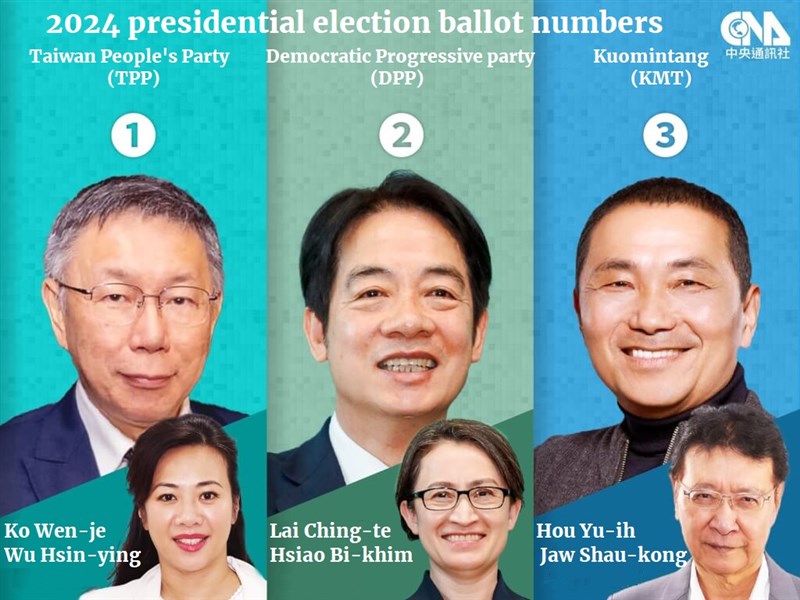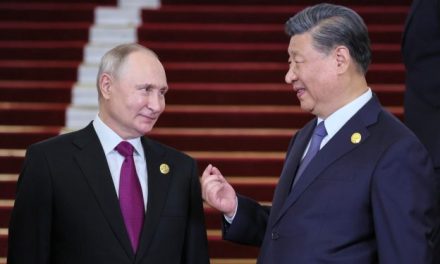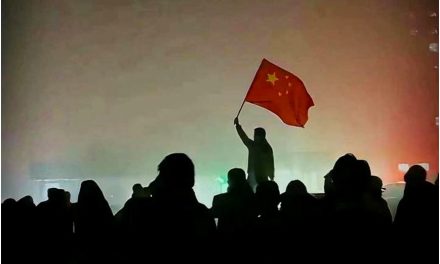By Zhibin Zhang
Jan 9, 2024
On January 13th, the presidential election in Taiwan is set to take place. At the end of last year, Lai Ching-te and Hsiao Bi-khim teamed up for an election campaign, launching an advertisement entitled “Made in Taiwan,” which caused a sensation in the Chinese-speaking world. Entering the new year, on January 2nd, the Democratic Progressive Party’s campaign team released a full campaign film titled “Together, On the Road.” In it, Tsai Ing-wen, Lai Ching-te, and Hsiao Bi-khim made a joint appearance. Tsai personally drove the car, engaging in meaningful dialogue with Lai along the way, and handed over the car keys to the “Lai-Hsiao team.” The film expressed confidence, courage, responsibility, and commitment through simple actions and words, vividly demonstrating the modesty, approachability, authenticity, and transparency that democratic politics can be.
As the saying goes, “One doesn’t fear not knowing the goods, but fears comparing them.” Beautiful and prosperous Taiwan, along with its vibrant democratic politics, poses a significant challenge to those authoritarian regimes plagued by economic troubles, political rigidity, and a lack of vitality. On YouTube, the “Together, On the Road” video already garnered millions of views in only three days. Among the comments, many in simplified Chinese characters expressed similar sentiments, that the video moved them to tears, and that they envied the Taiwanese for having the right to vote for their preferred candidates. They hoped that the Taiwanese would cherish their votes and choose the right leaders to follow the path of freedom and democracy.
“Just one trip abroad is enough to realize that Taiwan is truly at the forefront of the world,” Hsiao Bi-khim said in the film. Indeed, Taiwan, a small island nurturing a population of less than 23.5 million, boasts world-class talents, leading global technology companies, countless inventions and innovations, and a comfortable and peaceful living environment. Furthermore, Taiwan is proud of its universal health care and compulsory education system. Even more commendably, Taiwan possesses one of the world’s most advanced, transparent, and clean democratic political systems. In 2023, Taiwan ranked 12th globally with a score of 8.56 on the Human Freedom Index, leading Asia. According to the International Monetary Fund (IMF), Taiwan’s GDP per capita reached $32,643 in 2022, surpassing South Korea. In the 2023 ranking of the world’s wealthiest countries by Global Finance magazine, Taiwan outperformed developed nations like Germany, the UK, France, Japan, Canada, and Australia, ranking 14th globally. Calculated according to the United Nations Human Development Index (HDI) definition and methodology, Taiwan’s HDI of 0.926 places it 23rd among 190 countries and regions, classified in the “very high human development” category. It’s thought-provoking that Taiwan, lacking formal diplomatic relations with many countries, has garnered a host of the world’s highest-quality and steadfast allies, all built on shared values of freedom and democracy.
These facts illustrate that compared to seemingly powerful authoritarian nations, democratic Taiwan far surpasses them in national vitality and the well-being of its people, leaving them far behind. Taiwan’s humanized society doesn’t rely on competing skyscrapers or superficially attractive streetscapes for its charm. In fact, Taiwan’s most beautiful aspects can’t be encapsulated in these dry statistics. Months ago, I was fortunate to set foot on the free land of Taiwan and personally experienced the kindness and sincerity of its people. This experience starkly contrasts with the indifference, heartlessness, and lack of trust among people living under authoritarian regimes. The confidence, smiles, and genuine friendliness of the Taiwanese revealed to me their lifestyle and their hopeful aspirations for the future.
Hsiao Bi-khim’s words, “Just one trip abroad is enough to realize that Taiwan is truly at the forefront of the world,” brings to mind another quote from Zhou Youguang late in his life at the age of 108, “Observe China from a global perspective, not the other way around.” Even today, China’s state media tirelessly promotes the narrative that “under the leadership of the Chinese Communist Party, China has traversed a path of development in just a few decades that took Western countries several centuries.” However, traveling around the world, one can deeply sense how the international community views this nation burdened by authoritarian rule and how it looks with sincere admiration towards democratic Taiwan. This stark contrast exists, as Lai Ching-te said, because “Without peace and democracy, it is not Taiwan. This is the result of many people’s efforts.”
For democratic Taiwan, peace is of the utmost importance. Yet, authoritarian powers do not engage in profound reflection on the remarkable achievements of democratic nations. They do not contemplate reforming their decaying systems to set their nations on the right path. Instead, they do the opposite, seeking to use their power to influence, weaken, conquer, and assimilate others. As early as 2016, a report from the US Congress mentioned Russian interference in US elections. Canadian intelligence also disclosed that the 2021 Canadian elections faced interference from several authoritarian countries.
On the eve of Taiwan’s presidential election, many media outlets around the world reported that the Taiwanese Ministry of National Defense released information and trajectory images showing that from Monday to Wednesday of the previous week, 1 to 3 Chinese aerial balloons flew directly over the main island of Taiwan each day. On January 2nd this year, three of these balloons were detected southwest of Ching Chuan Kang in Taichung, near an airport and air force base. On the same day, China’s Central Television broadcasted prominently that the construction of the new aircraft carrier, the Fujian, is nearing completion. A few days ago, The Drive’s “The War Zone” column in the United States reported that commercial satellite images taken by Planet Labs on January 1st showed a full-scale physical model of a US Navy Ford-class aircraft carrier being constructed in the Taklamakan Desert in southern Xinjiang. The model even replicated the position of the four electromagnetic catapult tracks on the deck.
This reminded me of an article I wrote two years ago titled “The Xi-Biden Meeting: How Beijing Plans to Play the ‘Military Unification of Taiwan’ Card?” (first published in the ‘Yibao’ on November 14, 2021). Two years earlier, satellite photos had already shown simply constructed targets resembling American aircraft carriers and other naval vessels in China’s Taklamakan Desert. In that article, I wrote: If China really wanted to train its air force for precise strikes against US carrier groups in a Taiwan Strait conflict, simple rectangular shapes of similar size to the real ships would suffice. Knowing that US satellites cover the sky, if Beijing truly wanted to catch the enemy ships off guard in war, they would train in secret. However, Beijing’s actions defied logic, being ostentatiously over-the-top, clearly meant as a show for the United States. So why would Beijing do this?
On January 6th this year, Bloomberg reported a startling corruption scandal within the Chinese Rocket Force, including missiles filled with water instead of fuel, and a widespread problem in the western region where missile-launch well covers cannot function properly. Although these scandals have yet to be confirmed, they seem to corroborate Tsai Ing-wen’s statement at the New York Times’ DealBook Summit in November last year: “Given the numerous domestic challenges facing the Chinese government, a large-scale invasion of Taiwan is currently unlikely.”
Two years ago, I argued in an article that Beijing’s “tough stance” on the Taiwan Strait issue was illogical and did not align with the basic logic and rules that would lead to an imminent military conflict in the Taiwan Strait. A more logical inference would be that on one hand, it involves making preparations in terms of both experience and material resources for the potential future opportunity to reclaim Taiwan. On the other hand, and more importantly, China’s behavior is about creating a viable, impactful, and relatively low-cost bargaining chip for future Sino-American talks on various aspects of international affairs, political diplomacy, economic and trade relations, technology, and cultural exchanges, not to mention global climate issues. Evidently, Beijing’s recent display of a tough coercive stance on the Taiwanese election also encompasses these factors.
Today, the challenge of authoritarianism to democracy is becoming more severe, with economics and technology becoming the battlegrounds of a long-standing duel. Some politicians cultivated under the principles of open and transparent democratic politics may not necessarily have more foresight or be better at handling complex issues and economic interests than dictatorial politicians adept at playing power games and conspiracies. The long-term policy of appeasement in the economic and technological fields by democratic countries has led to a dilemma akin to nurturing a tiger only to court disaster. Russia’s blatant invasion of Ukraine demonstrates that the duel between democracy and authoritarianism is inevitable, and the democratic alliance has been pushed to a point where it can no longer retreat.
Today, Taiwan has become a beacon of democracy in East Asia and another frontline in the confrontation between the camps of democracy and authoritarianism. Therefore, at this critical moment, I want to say to the Taiwanese: there is no cure for regret. Your vote is of the utmost importance. Please think carefully, cherish your rights, take responsibility, and use your vote to choose the right person and the path that will preserve freedom and democracy.
【议报首发,转载时请务必在正文之前加上出处和链接:https://yibaochina.com/?p=252191】
This piece was translated from Yibao Chinese. If republished, please be sure to add the source and link https://www.yibao.net/?p=247702&preview=true before the text when reposting.





















